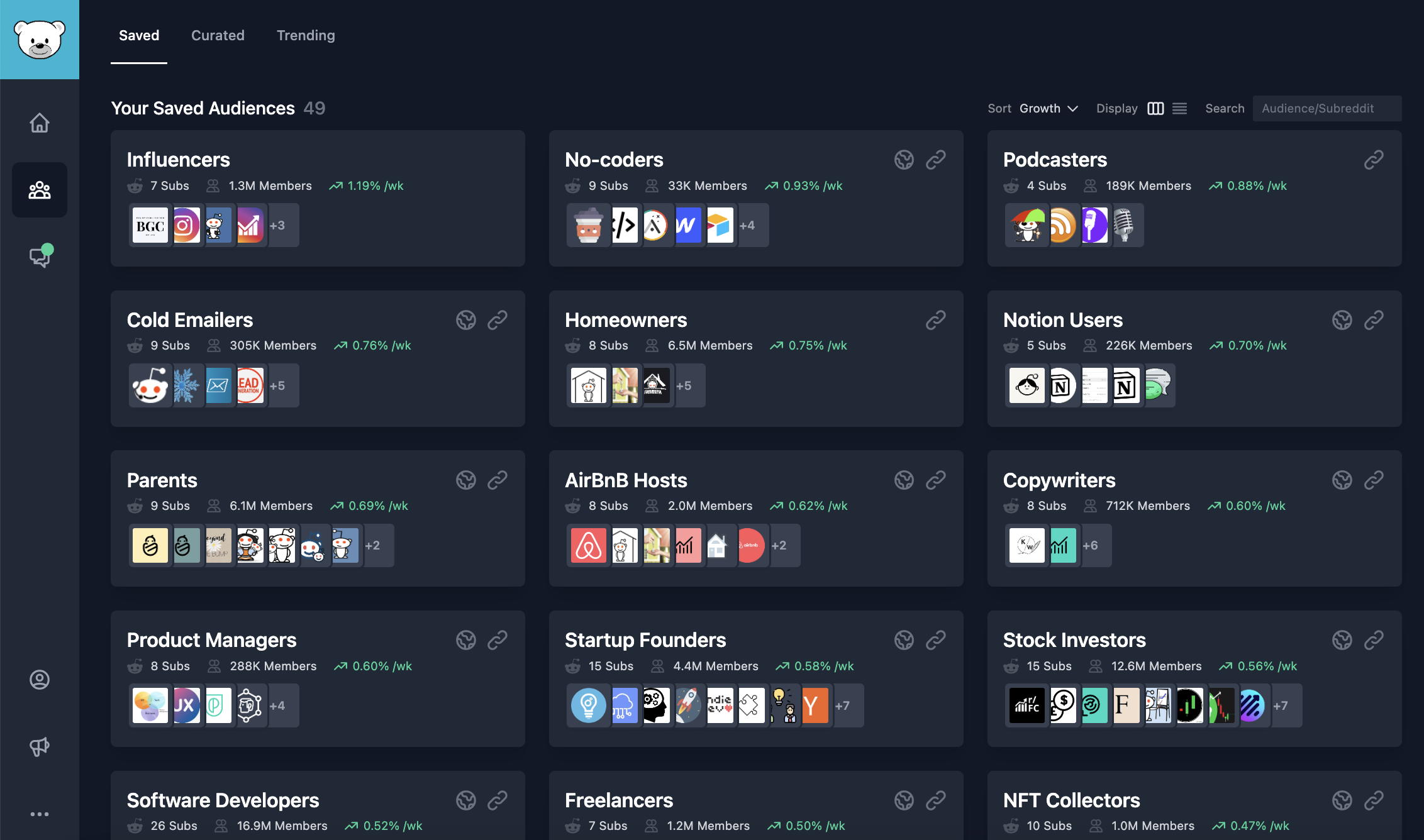Online communities at every stage of the startup journey
When it comes to online communities, I've been around the block. After curating over 700 of the internet's best communities for the Hive Index and joining many of them, I'd consider myself
an expertwell-traveled in the world of online communities.
One conclusion that I've settled on (and I'm not the only one), is that niche online communities can be a startup founder's best friend.
By tapping into these communities, a product maker or business owner can grow alongside the community, serving its members and themselves at the same time. No matter the size of your venture, here are the 5 stages at which you can leverage online communities to advance your business.
1. Idea Generation
If you'll entertain a huge generalization, the primary objective for a business is to solve problems for customers. So if you're striving to start a business, you start with finding a painful problem to solve, so painful that the person who has it is willing to throw money at it to make the problem go away.
The good news is that people love talking about their problems, especially online. Looking for a product to build? Find an online community full of your target audience, and you are sure to find plenty of inspiration for products to build.
Don't know who your target audience is? I suggest thinking about a few groups of people who you wouldn't mind spending the next couple years of your life with. You could have a brilliant app idea for tax accountants, but if you're not excited about spending a significant amount of your time talking to them about their problems & emotions, you probably don't want to build a product for them.
Once you find these online communities, go deep! Do your research, get to learn the lingo & culture behind these communities. Each community is different, and knowing how they interact will help you talk to the members and eventually build a business around serving their unmet needs.
If you have a way of analyzing the conversations in the community, look for emotional keywords that highlight pain points that are shared amongst multiple community members.
- "Any tools" / "Anyone know of" - product opportunity
- "Does anyone know" - knowledge/resource opportunity
- "I hate using" - competition opportunity
- "Does anyone else" - unbundling opportunity
One of the things that GummySearch does best is surface these conversations from Reddit for any niche you are exploring. If you're looking for ideas and think your target audience might be on Reddit, do this research on GummySearch with speed & ease ⚡️⚡️⚡️
2. Validate a Solution
You have a product idea to solve a problem. Next step - go talk to people!
Making a post in the community like "I'd like to chat with you for 20 minutes if you're ever been bothered by {{problem_you're_solving}}" should get you some willing participants if you are working on a problem worth solving. If you can't find people to talk to, and your problem isn't worth talking about (let alone paying for), your validation is over ☠️
I wrote a pretty in-depth idea validation guide, check it out for the full set of steps & resources that have helped myself and hundreds of other makers in their validation journey.
3. Find Initial Customers
Once you've validated and built your product, you already know where to look for customers - the same communities that helped you generate your idea and validate it. This happens in 2 flavors.
Announcing your solution
If you're built a solution specifically to solve a pain point for a particular community, you'll probably want to let them know about it! When it comes to getting first customers, this is one of the highest impact & lowest effort things that you could do. No ad-spend necessary, no months waiting for SEO to kick in, no effort necessary to build up an audience on social media. Just craft your pitch carefully and let the people know!
If you do this well, you'll be greeted with appreciation, feedback, and hopefully some of your first users/customers. My tip here is to focus on the why, and talk about the problem you're solving for this community based on all of the research/conversations you've had.
What's worth mentioning is that some communities have strict rules on self-promotion, so you need to be careful with how you frame it. Make it more about the community, and add a new tool to their toolbelt, rather than just try to advance your business.
This announcement is likely going to bring some great things your way, but don't push your limits. If you start just posting your link multiple times, you turn from someone announcing their services to the community, to someone who's spamming it.
Social Listening
It's unlikely that everyone in the community saw your announcement and knows that you can solve their problem. Like yourself, not everybody reads every single post in the community.
If the problem you're solving is prevalent in the community, it will come up in future conversations. You can search the conversations that contain keywords related to your problem/solution, and if the situation calls for it, let the community know that you can actually solve this issue for them.
The beautiful thing about online communities is that people are always asking for help or venting about problems. As someone that has studied this problem & built a solution to them, you pitching that solution when someone asks for it is actually helping them get the resources that they need. Yes, it's self-promotional. But unless you're doing it shamelessly in non-relevant situations, it's helpful.
This is what I call a win-win-win. The person asking for a resource asks for help and gets it. You offer your solution and engage with a potential customer. And the rest of the community benefits as well because those interested in the topic at hand learn of a new resource that they might find useful as well.
Most people think of posting to online communities to get their first customers, but they don't realize the power of being in the right place comment at the right time. It works, trust me. And you're not likely to get kicked out of the community for self-promotion because you're actually contributing to helping other members.
I originally built GummySearch to promote The Hive Index when people were asking for online communities to join on a particular topic. It has worked beautifully for me, and it could for you as well.
I suggest tracking keywords in relevant communities that are related to pain points your product solves, competitor names, and topics that you have written blog posts on.
4. Growth Engine
The above techniques are fantastic when you are getting started. However, the results are linearly correlated with the time that you put in. That works when you are in the "do things that don't scale" phrase, but at a certain point in your startup's journey, you might be looking to scale with exponential growth.
That's where a content strategy comes in. To establish trust with as many potential customers as possible, content is king. Write useful content for your niche, and publish it in relevant online communities.
Good content is exponential in many ways. First of all, the community becomes your marketing team and shares your content with other target customers that aren't aware of your solution yet.
Secondly, if the conversations in the community are publically available (like Reddit, HackerNews, IndieHackers) your posts will be indexed by search engines. This content will be disoverable by others searching for your resources, and if your website is linked in the content it will build up high-ranking backlinks.
Reddit is one of my favorite online community platforms for many reasons, but one of those reasons is that they have invested heavily in SEO. If you have a consistent content strategy on Reddit, you will build up SEO juice for your own website. Keep this in mind when you are linking to your own website, it helps to have the anchor tag be a keyword that you'd like to rank higher on in Google Search.
You can combine your content strategy with your social listening one. By building up some helpful blog posts on topics your target audience is interested in, that increases the amount of conversations you can be helpful in. Now you can not just post links to your solution when community members are venting about problems you can solve, you can also reply to questions on certain topics with your helpful blog posts. People read your good content -> People trust you -> People buy your products.
5. Product Moat
At a certain stage in your startup, you're at the point where you have your acquisition channels figured out. You probably are well-funded and have the cash to invest in advertisements, or (even better) are running a profitable business already.
To stay on top, you need to keep your product a winner in the market. Well guess what, online communities can help with that as well.
By creating a community for your own users, you can keep up with the needs of your customers and the market. It's your community and you can structure it how you'd like. You can share product updates, get open feedback, or tap into your dedicated customer base to bounce new ideas off of.
Additionally, your customer support needs have probably grown as your business has grown. One of the best parts of having a dedicated online community for your users is that they can help each other with common questions, issues, and resources.
There's a reason there's so much hype about online communities these days.
A handy tool in the toolbelt, for pretty much any B2C industry (and some B2B), at any stage in a product's lifecycle.



